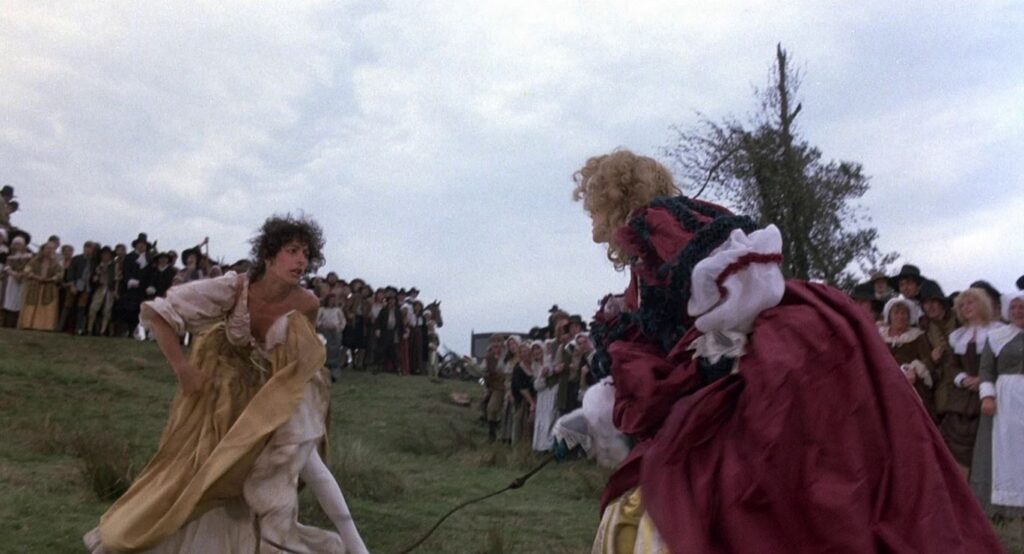
Director Michael Winner filters Leslie Arliss’ melodrama through the exploitation genre and winds up with a masterpiece of high camp. The Wicked Lady (1983) is one of Michael Winner’s projects with the Canon Group and thus retains the production company’s trademarks of gratuitous nudity and low level production values. It is Faye Dunaway as Lady Skelton, giving a performance that dwarfs her portrayal of Joan Crawford in Mommie Dearest (1981), who elevates The Wicked Lady to the level of some kind of delirious post modernism.
I first heard of this film due to the fact that I’m a trekkie. Marina Sirtis has a small part as the character Jackson’s (Alan Bates) girlfriend. During Sirtis’ brief screen time she has a topless whip battle with Dunaway. This bizarre spectacle only fits the film because of Faye Dunaway’s performance. Every close-up suggests a mania and every gesture broadcasts a subtext to the point that Lady Skelton seems to have erupted from some fever dream.
Overall the cast gives performances that vary from the wooden (Oliver Tobias, Glynis Barber) to those who appear to be relishing the level of camp Dunaway has brought to the table (Bates, John Gielgud, Denholm Elliott). For instance, just before Dunaway and Sirtis really get going at their whip duel Winner cuts to a close-up of Oliver Tobias. Tobias hears the rowdy crowd cheering the women on and he turns, speaking directly into the camera “What’s going on over there?”. Tobias’ delivery is completely flat, void of emotion, a stark contrast to Dunaway and Sirtis.
The Wicked Lady opens with titles appearing over a short sequence wherein Denholm Elliott witnesses a domestic dispute between two of his tenants. The title card that reads “directed by Michael Winner” appears on screen over a woman’s bare breasts as she runs through the village square. The film ends ninety minutes later with Faye Dunaway, having been shot, crawling across her bedroom floor crying “I don’t want to die alone!” as Winner’s camera pulls back in a crane shot from the window and beyond. Between these opening and closing moments is a film as unhinged as one could possibly hope.
The Wicked Lady isn’t a bad film though, it’s probably my favorite Michael Winner film. The tale of a 17th century Lady moonlighting as a highwayman is compelling enough, and relatively unique within the mainstream of its moment. Lady Skelton is a manipulative seductress, a rogue, a bandit, and a rake. She is everything you rarely see women get to be in movies, and Dunaway executes her role with complete abandon. At times, when Winner cuts to close-ups of Dunaway’s hypnotic eyes, the film recalls Joan Crawford in Johnny Guitar (1955). Dunaway, the heir to Crawford in many respects, is truer and more honest in her campiness than even the most sincere dramatic player.
